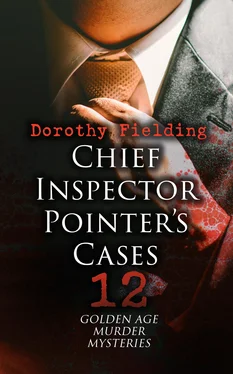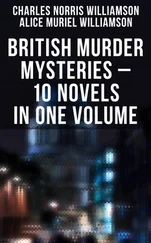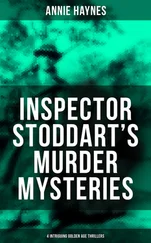"I've just come from Mrs. Thompson; she requested me to see you." There was no doubt as to Major Thompson's embarrassed bewilderment.
"Oh—ah—I see. But didn't my wife explain—" he gazed wildly around for his tea.
"No, Major Thompson, she did not. The onus of proof rests on you." And Mr. Deane fixed his pince-nez more firmly on his nose, and eyed the man across the table.
"Well, but—by jove—my wife told me—I mean Miss Leslie"—the major saw salvation and snatched at it—"you should see Miss Leslie. Miss Leslie is the person—"
"Not at all." Mr. Deane stiffened. "My client was only able to identify the young lady, it is true, but she only comes into the case as identifying or not your car."
"I see. Well, then, it's all quite simple. I never was anywhere near Richmond Park at the hour you mention."
"Nor your car?"
"Go and have a look at the old bus. There isn't any paint on her to scratch, but the mud of centuries ought to do as well. If you can find any dent on her—ah, here's my tea. I see you had shrimp sandwiches, too. Shows this isn't your first visit here, eh?"
But Mr. Deane was not to be diverted.
"My client," he began with his dry, preparatory little cough, "fixes the hour at about four-thirty, or a little later. If you will kindly state—with, of course, some—ah—proofs—that neither you, Miss Leslie, nor the car were near Richmond Park at the hour of the collision, the matter would drop, as far as you are concerned. It must be, of course, a simple matter for you to establish your whereabouts at the time in question."
The major drank long and deep. Then he placed his empty cup in its saucer with something of a bang.
"I was playing bridge with my wife and friends at home, Miss Leslie had gone on to some friends, and the bus was in my garage. I fetched Miss Leslie, who is an old school-friend of my wife's, at two o'clock from the Columbine, as you say they told you at the theatre, and drove her home to Richmond. We had intended to go on the river, but my wife refused to go out in the launch on account of the look of the sky, and suggested bridge instead. Miss Leslie didn't seem to care for cards, and decided to taxi on to some friends. So we put her into a cab—she refused to let us take her in the car—and off she went about a quarter to three. And as I haven't seen her since, she couldn't have been with me at four-thirty near any park."
Mr. Deane tapped his teeth reflectively.
"Um—m. I'm afraid—my client claims pretty heavy damages—his car's a wreck, though he says that the one which ran into him was barely dented. And about Miss Leslie—I understood that Miss Leslie said she was with you and your wife all afternoon. I think there's some mistake—I think there is."
The major began to show signs of distress. He dropped a sandwich, but Mr. Deane foiled that time-honored device to gain time by instantly bringing his foot down on it with a vigor surprising in one of his deliberate movements. The major cast one sulky glance on the savory morsel adhering to his visitor's boot, and gulped down a word or two. He took up the last sandwich, but after a glance at Mr. Deane's general attitude of "ready," sat munching it with a thoroughness which would have moved the late Mr. Fletcher himself to admiration.
"Well, sir?" asked Mr. Deane tartly.
The major chewed on in silence. Finally there was no help for it; he had to swallow the last crumb, but no shipwrecked sailor could have done so more lingeringly.
"Well, of course, if Miss Leslie said so—of course she was. I suppose I've got it muddled. As a matter of fact—now I think of it—of course we all played bridge all afternoon."
" All afternoon?" repeated Mr. Deane, as though unable to believe his ears.
"No, no, no!" corrected the hapless major, "just till about—about—oh, hang it all, I never notice time when I am at cards. But as a matter of fact, I believe we left off quite early—that is, relatively, you know. Every's relative nowadays, thanks to old Einstein—what?"
Mr. Deane sat awhile in silence. The two were quite alone on the balcony. He decided that the time had come for him to make way for the Chief Inspector. It was a pity, for Mr. Deane had thoroughly enjoyed himself. When he spoke, his voice had changed totally.
"I have something I would like to say to you, sir. Would you mind walking out on to the links with me?"
The major gave him a penetrating glance.
"Certainly. Come this way." They strolled off into utter silence and safety from eavesdropping.
"C.I.D. man, eh?" asked the soldier. "Anything wrong at the Office?"
"No, sir, not to my knowledge. I am Chief Inspector Pointer, of the Yard, as you guessed. I'm on a queer suicide case which has taken place at the hotel Miss Leslie is stopping at—the Enterprise—in the room adjoining hers, in fact. We hope to keep it out of the papers till the inquest on Wednesday. Now, as you, of course, know, sir, every case of suicide that isn't as clear as daylight has to be sifted by us pretty thoroughly. Part of the sifting in this case is to place the people's whereabouts who were on the same floor—the first floor. It's a question, roughly, of the hours between four to six on last Saturday afternoon. Miss Leslie is among the other people. You quite understand, sir, that it's a mere matter of form, that we know from the hotel employees that she wasn't in the hotel till much later in the day; but that isn't enough. We must try to have alibis for everyone on the floor between those hours, if it's a possible thing; and if it isn't, we must know why it isn't. Now, sir, can you tell me where Miss Leslie really was during those hours?"
Major Thompson thought awhile.
"I don't know that I care to make any statement in so serious a matter as this," he said finally. "Miss Leslie will give you any information you ask for—any that you have a right to—I am quite sure," and he turned away.
Pointer stopped him.
"Ah, but I can't explain things to Miss Leslie. Not a soul must know that the case isn't a perfectly clear suicide. That's why I adopted my little ruse with you just now, sir. I should have preferred not to have told even you about the matter. Doubtless the young lady would explain her movements on Saturday afternoon, if she knew why I am interested in them; but as I can't explain my reasons to her, I doubt very much if she won't refuse to tell me anything."
"I see." The major again thought awhile. "Yes, I see your point, Inspector, though I owe you something for pulling my leg in that unconscionable way, and stepping on the choicest sandwich."
Pointer repressed a grin.
"I'll be quite frank with you. There was Miss Leslie, my wife, my son Henry, and my son's fiancée at the bungalow on Saturday afternoon. My wife and the other young lady decided—very sensibly—that the weather was much too threatening for an outing on the river, but Miss Leslie, for some whim, tried to insist on our taking the launch out. Henry, of course, backed her up, like an idiot. My wife refused to go, the young lady refused to go—I kept myself out of it all by cleaning the car"—the major glanced at the disreputable old Armstrong, stiff with mud, which was standing a few yards from the two men—"and the upshot was that Miss Leslie and Henry decided to go in the launch, while my wife and Edith went into the house to get tea ready for them when they would return. I saw the silly young optimists off, and we expected them back within a quarter of an hour. But not a bit of it! Henry was beginning to see what a fool he was, but a girl doesn't see reason so quickly. It was nearly seven o'clock before the two returned, soaked through, of course. Miss Leslie has some friends higher up the river: they had pulled up there, had tea with them, and then made for home in all that downpour! After that, she took a taxi from our house and went back to her hotel; and if you know of a madder way of spending last Saturday afternoon, I don't. My wife is furious with her, and Edith is furious with my son."
Читать дальше












